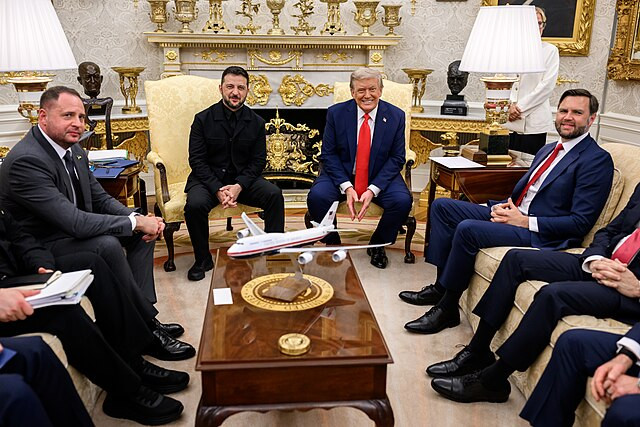President Donald Trump on Monday hosted Ukrainian President Volodymyr Zelenskyy at the White House, signaling a warmer rapport than their tense February meeting but refusing to commit to a ceasefire as part of efforts to end the war with Russia.
The Oval Office session came just days after Trump's summit with Russian President Vladimir Putin in Anchorage, where Trump suggested the next step would hinge on Zelenskyy agreeing to concessions. European leaders also gathered in Washington for follow-up talks aimed at shaping a peace framework.
"I don't think you'd need a ceasefire," Trump told reporters, referencing past deals he claimed to have brokered. "If you look at the six deals that I settled this year, they were all at war - I didn't do any ceasefires." He added: "I like the concept of a ceasefire for one reason, because you'd stop killing people immediately ... but we can work a deal, we're working on a peace deal while they're fighting."
Zelenskyy struck a conciliatory tone, praising Trump for inviting him and echoing the U.S. president's "peace through strength" mantra. "We are ready for trilateral," Zelenskyy said, referring to a potential meeting that could include Putin and European leaders.
Trump, however, left open questions about security guarantees, including whether U.S. troops could eventually be deployed to Ukraine. "We'll let you know that, maybe, later today," he said, noting that European nations would remain "the first line of defense" but that Washington "will be involved."
Asked if failure to reach a deal would end U.S. support for Kyiv, Trump said, "It's never the end of the road. People are being killed and we want to stop that." He later emphasized that peace must be lasting: "We're going to make sure that if there's peace, that peace is going to stay long-term ... We're not talking about a two-year peace and then we end up in this mess again."
The tone of Monday's talks contrasted sharply with February, when Trump and Vice President JD Vance berated Zelenskyy for what they called a lack of leverage. This time, Vance remained silent as Trump and Zelenskyy engaged in lighter exchanges with the press. When pro-Trump reporter Brian Glenn complimented Zelenskyy's attire-"you look fabulous in that suit"-Trump joined in, recalling Glenn's previous jab about Zelenskyy's wardrobe. "That's the one that attacked you last time," Trump joked. Zelenskyy responded, "You see I changed; you are not."
The Ukrainian president outlined two priorities for his country's security: strengthening its army through weapons sales and training, and gaining credible guarantees from NATO, the U.S., and European partners. Trump declined to rule out military involvement, underscoring that "it's very important to get the deal done."
Still, Trump's recent remarks have unsettled Kyiv and European capitals. Over the weekend, he said Zelenskyy could end the war "almost immediately, if he wants to," and asserted there would be "no getting back" Crimea and "NO GOING INTO NATO." Fiona Hill, a former White House Russia adviser, told Politico: "Trump has completely ceded narrative control to Putin."





